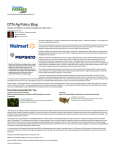Researchers question fructose's role in obesity and brain functioning

Writing in Nutrition Journal, the research team noted that the incidence of obesity has increased dramatically over the past several years, and in parallel, so has the prevalence of type 2 diabetes (T2D) - adding that many studies have suggested that both obesity and T2D are associated with lower cognitive performance, cognitive decline, and dementia.
Led by Shaheen Lakhan from the US-based Global Neuroscience Initiative Foundation, the researchers , more than 60% of adults living in the U.S. and Europe are now classed as obese - with a body mass index (BMI) of greater than 30 kg/m2.
"Not only does midlife obesity increase the risk of developing late-life dementia, but also lower cognitive performance earlier in life is itself a risk factor for dementia later in life," said the team.
"With the rising trend in childhood obesity, causing children to be at risk of diabetes and metabolic syndrome, the potential contribution of fructose to lower academic performance in adolescents is becoming increasingly realised," they suggested. "This raises concerns regarding the short and long-term effects of fructose in humans, and the possibility that fructose intake in childhood is associated with poorer academic performance and impaired cognitive function as an adult."
Review details
Lakhan and colleagues focused on the emerging evidence that obesity and dietary intake of certain foodstuffs may have an effect on cognitive functions - noting that intakes of fructose, along with HFCS have increased over the past three decades.
"What has recently emerged is the association of obesity with cognitive decline and that intake of added sugars may mediate the influence of obesity on cognitive function," they said.
"Although obesity may not be enough to warrant concern among parents, the lower academic potential of obese adolescents strongly argues for early treatment of childhood obesity and comprehensive intervention, including a limitation of sweetened soft drinks."
The team noted that 'equally important' to cutting out added sugar may be the exploration of the role dietary omega-3 fatty acids play, "which appear to have beneficial effects on cognitive function and attenuate high-fructose associated cognitive decline."
Source: Nutrition Journal
Published online ahead of print, doi: 10.1186/1475-2891-12-114
"The emerging role of dietary fructose in obesity and cognitive decline"
Authors: Shaheen E Lakhan and Annette Kirchgessner

















